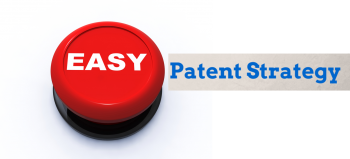 In my role as the IP Strategist for a number of companies that do not employ in-house patent counsel, I am charged with making sure that my clients’ patenting efforts are in tune with their desired business outcomes. This means that instead of focusing on the drafting and prosecuting of patent applications that form the basis of most patent attorneys’ practices, I work at the front end of the patenting process to design patent strategies that will enhance my clients’ business value first and foremost. When alignment is created with business goals, subsequent patenting efforts will necessarily result in protection that matters to the value of the company. In this regard, I have a number of tools in my “Patent Strategy Toolbox” that I deploy regularly when developing patent prosecution recommendations. Notably, when I mention these tools to new clients,
In my role as the IP Strategist for a number of companies that do not employ in-house patent counsel, I am charged with making sure that my clients’ patenting efforts are in tune with their desired business outcomes. This means that instead of focusing on the drafting and prosecuting of patent applications that form the basis of most patent attorneys’ practices, I work at the front end of the patenting process to design patent strategies that will enhance my clients’ business value first and foremost. When alignment is created with business goals, subsequent patenting efforts will necessarily result in protection that matters to the value of the company. In this regard, I have a number of tools in my “Patent Strategy Toolbox” that I deploy regularly when developing patent prosecution recommendations. Notably, when I mention these tools to new clients,
10 Key IP Strategy Insights for Innovative Companies for 2016 and Beyond
 As 2016 begins, I am entering my 8th year(!) of writing about IP strategy insights from a business value creation perspective, both here on my IPMaximizerBlog.com and, more recently, on LinkedIn. While there were quite a few IP lawyers writing blogs in 2008, no one else was then writing about IP strategy. Today, there are even more IP lawyers writing blogs about IP law, but still almost none writing that address IP strategy topics that are meaningful outside of the IP monetization and large IP portfolio context. Over the years, it has sometimes seemed like I was the proverbial "lone voice in the wilderness" who speaks frankly (or as one of my regular readers said to me last year "bravely") about how innovators can take charge of their IP strategy to create value and reduce
As 2016 begins, I am entering my 8th year(!) of writing about IP strategy insights from a business value creation perspective, both here on my IPMaximizerBlog.com and, more recently, on LinkedIn. While there were quite a few IP lawyers writing blogs in 2008, no one else was then writing about IP strategy. Today, there are even more IP lawyers writing blogs about IP law, but still almost none writing that address IP strategy topics that are meaningful outside of the IP monetization and large IP portfolio context. Over the years, it has sometimes seemed like I was the proverbial "lone voice in the wilderness" who speaks frankly (or as one of my regular readers said to me last year "bravely") about how innovators can take charge of their IP strategy to create value and reduce
“IP Strategy” is Meaningless without Desired Business Outcomes
"You can't sell me IP Strategy, Jackie," one of my top clients said to me recently when I sat down with him to conduct customer discovery for my IP Strategy practice. This client, a successful serial entrepreneur whose company has engaged me as "fractional Chief IP Counsel" for the last 1.5 years, swears by the services I provide to him--so much so, that he is a primary source of startup entrepreneur referrals that I obtain today. I was thus surprised that he didn't see my value as providing him with "IP Strategy," but as something else entirely. He said: "If I had to go on the record of why I value your expertise, it's because IP is important to my exit, and you look at IP differently than any other lawyer I have known. I know you're focused on creating value for my startup, so I want to keep you
How Startup Patent Filing is Different
 The prevailing view of patent experts who advise innovators--be they individuals or companies--it that patent filings should occur as early as possible. This advice, which is even more prevalent now that the US has moved to a "first to file" system, exacerbates the significant problem of worthless patents that I have written about previously. To summarize, by "worthless," I mean that the innovator's patents will not cover anything that consumers desire to buy. Logic thus dictates that patents will be irrelevant to the startup, as well as expensive wastes of time, unless protection aligns with a validated customer demand for the innovator's product or technology.
This is where a key difference falls out between the patent filing strategies for established companies and startups where each is developing innovative products or technology. The former already have products in the market and customers that
The prevailing view of patent experts who advise innovators--be they individuals or companies--it that patent filings should occur as early as possible. This advice, which is even more prevalent now that the US has moved to a "first to file" system, exacerbates the significant problem of worthless patents that I have written about previously. To summarize, by "worthless," I mean that the innovator's patents will not cover anything that consumers desire to buy. Logic thus dictates that patents will be irrelevant to the startup, as well as expensive wastes of time, unless protection aligns with a validated customer demand for the innovator's product or technology.
This is where a key difference falls out between the patent filing strategies for established companies and startups where each is developing innovative products or technology. The former already have products in the market and customers that
Protecting Your Company’s Value – Think Beyond the “Usual IP Suspects”
It’s not uncommon for entrepreneurs to think about what I call “the Usual IP Suspects”--that is, patents, trademarks, copyrights and trade secrets--when they consider protection of their company’s value. I learned working as patent attorney at a prestigious IP law firm, and later in a corporate environment, that often a company’s value can exist in forms other than these most recognized forms of IP protection. Indeed, for many companies, a great deal of value can reside in the broad class of “intangible assets.” It is then important for company leaders to identify and protect these less recognizable forms of company value. The B-School types say, “what isn’t managed can’t be measured,” and this goes for intangible assets, too. But, you can’t manage something that you have not first identified as being part of your business from which you can derive value.
I help clients think beyond “the Usual IP Suspects” to develop an inventory of intangible assets
The Medical Device Patent Strategy Problem-Case Study
 An IP Strategist like myself spends considerable time "Monday Morning Quarterbacking" patent strategy for medical devices and other inventions for the purposes of valuation, commercialization and otherwise. In this regard, I am frequently asked to review medical device patents to provide my opinion regarding claim coverage in relation to commercialization potential. Most of these reviews indicate that the medical device patent fails to create a scope of protection sufficient to justify the investment needed to fully realize the value of a new market opportunity. Alternatively, I will provide a "freedom to operate" opinion to a competitor that wishes to enter the market with a non-infringing alternative but which nonetheless leverages the key insights that formed the basis of the patented medical device innovation.
An IP Strategist like myself spends considerable time "Monday Morning Quarterbacking" patent strategy for medical devices and other inventions for the purposes of valuation, commercialization and otherwise. In this regard, I am frequently asked to review medical device patents to provide my opinion regarding claim coverage in relation to commercialization potential. Most of these reviews indicate that the medical device patent fails to create a scope of protection sufficient to justify the investment needed to fully realize the value of a new market opportunity. Alternatively, I will provide a "freedom to operate" opinion to a competitor that wishes to enter the market with a non-infringing alternative but which nonetheless leverages the key insights that formed the basis of the patented medical device innovation.
To this end, a medical device investor recently engaged me to conduct a preliminary review of a
Patent Early? Maybe Not
Patent lawyers almost always instruct inventors to file for patent protection at the earliest possible date, but maybe this is not the best advice for many startups. To the contrary, I think this conventional advice is flawed--at least when it applies to inventions involving unproven products with no known customer base. Put simply, unless customers show that they care about the product that will be covered by the patent such that they are willing to pay more than it costs to make the product in volumes that will lead to sustainable profits, the patent will provide value only for the attorney who files it. Indeed, the absence of customers who wanted to buy the product is why very few of the patents that I have obtained for
Who Needs a Patent?
 My response to the question posed in the title of this post is typically: “the only person who needs a patent is a patent attorney.” Indeed, if a patent attorney fails to convince clients like you that they need to obtain a patent, she will quickly lose her livelihood. You should therefore be skeptical if a patent attorney recommends that you move forward with a patent without also advising you to first fully evaluate your business model, your go-to-market strategy and the competitive landscape and determining along with you how the available patent protection may allow you to realize your company's revenue and exit goals.
My response to the question posed in the title of this post is typically: “the only person who needs a patent is a patent attorney.” Indeed, if a patent attorney fails to convince clients like you that they need to obtain a patent, she will quickly lose her livelihood. You should therefore be skeptical if a patent attorney recommends that you move forward with a patent without also advising you to first fully evaluate your business model, your go-to-market strategy and the competitive landscape and determining along with you how the available patent protection may allow you to realize your company's revenue and exit goals.
This is not to say that patents are never the right thing or even often the right thing for entrepreneurs. To the contrary, examples abound for companies where patents served as a primary means of
Do Startups Need Patents? Rigorous Study Presents Real Data on Startup Company Patenting Behavior
 As an IP Strategy advisor, I am often asked by the leadership of startup companies what the return on investment is from patenting. While I can confidently provide recommendations as an expert, my opinions are anecdotal based on my almost 20 years experience as an IP professional. Certainly, I have advised a number of startup companies over the years for which comprehensive patent coverage was critical to financial and market success. On the other hand, I have advised a much larger number of startup companies over the years where patenting made little difference to their fortunes.
The subjective nature of IP advice holds for other patent professionals. Our respective years of experience results in tacit knowledge that becomes "expertise." This expertise guides clients to us for advice and allows them to trust in our counsel. Missing from my knowledge
As an IP Strategy advisor, I am often asked by the leadership of startup companies what the return on investment is from patenting. While I can confidently provide recommendations as an expert, my opinions are anecdotal based on my almost 20 years experience as an IP professional. Certainly, I have advised a number of startup companies over the years for which comprehensive patent coverage was critical to financial and market success. On the other hand, I have advised a much larger number of startup companies over the years where patenting made little difference to their fortunes.
The subjective nature of IP advice holds for other patent professionals. Our respective years of experience results in tacit knowledge that becomes "expertise." This expertise guides clients to us for advice and allows them to trust in our counsel. Missing from my knowledge
Presentation: IP and Patent Strategy for Business Value Creation–The Good, The Bad and The Ugly
While postings have not been frequent in 2013, I have nonetheless been very busy with my IP Strategy counseling and speaking engagements. In 2014, I will commit to being much more diligent in updating my blog with relevant content for those seeking to use IP and intangible asset strategy to create and maximize business value. In the meantime, here is the deck from IP Strategy Overview I presented at a conference of innovators at Georgia Tech's College of Architecture in October 2013. The summary is below the presentation. (To view the Slideshare presentation you view the full post in IP Asset Maximizer Blog.) This deck includes the basic overview of IP (patents, copyrights, trademarks, trade secrets). However, this presentation goes beyond the usual lawyer-generated content to highlight not only the positive business aspects of IP, but also to give a reality check as to the likely ROI of investment in protection.




